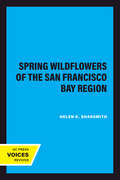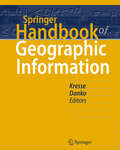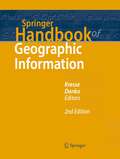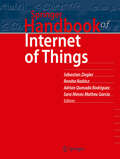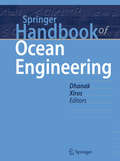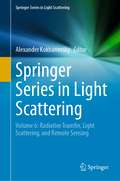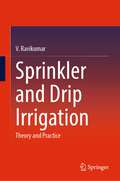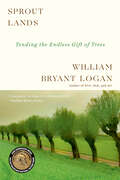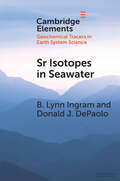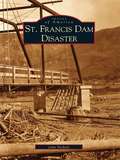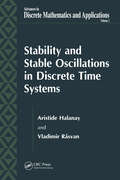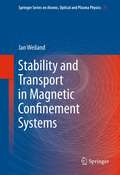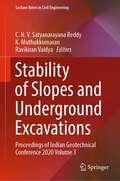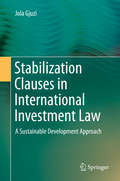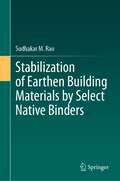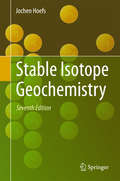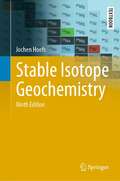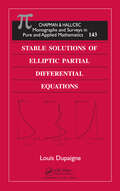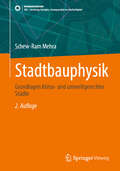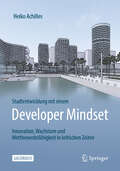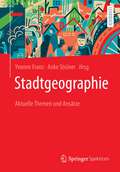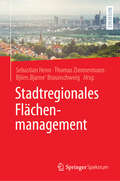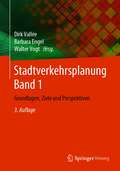- Table View
- List View
Spring Wildflowers of the San Francisco Bay Region (California Natural History Guides #11)
by Helen K. SharsmithThis title is part of UC Press's Voices Revived program, which commemorates University of California Press’s mission to seek out and cultivate the brightest minds and give them voice, reach, and impact. Drawing on a backlist dating to 1893, Voices Revived makes high-quality, peer-reviewed scholarship accessible once again using print-on-demand technology. This title was originally published in 1965.
Springer Handbook of Geographic Information
by Wolfgang Kresse David M. DankoComputer science provides a powerful tool that was virtually unknown three generations ago. Some of the classical fields of knowledge are geodesy (surveying), cartography, and geography. Electronics have revolutionized geodetic methods. Cartography has faced the dominance of the computer that results in simplified cartographic products. All three fields make use of basic components such as the Internet and databases. The Springer Handbook of Geographic Information is organized in three parts, Basics, Geographic Information and Applications. Some parts of the basics belong to the larger field of computer science. However, the reader gets a comprehensive view on geographic information because the topics selected from computer science have a close relation to geographic information. The Springer Handbook of Geographic Information is written for scientists at universities and industry as well as advanced and PhD students.
Springer Handbook of Geographic Information (Springer Handbooks)
by Wolfgang Kresse David DankoThis handbook provides an exhaustive, one-stop reference and a state-of-the-art description of geographic information and its use. This new, substantially updated edition presents a complete and rigorous overview of the fundamentals, methods and applications of the multidisciplinary field of geographic information systems. Designed to be a useful and readable desk reference book, but also prepared in various electronic formats, this title allows fast yet comprehensive review and easy retrieval of essential reliable key information. The Springer Handbook of Geographic Information is divided into three parts. Part A, Basics and Computer Science, provides an overview on the fundamentals, including descriptions of databases and encoding of geographic information. It also covers the underlying mathematical and statistics methods and modeling. A new chapter exemplifies the emerging use and analysis of big data in a geographic context. Part B offers rigorous descriptions of gathering, processing and coding of geographic information in a standardized way to allow interoperable use in a variety of systems; from traditional methods such as geodesy and surveying to state-of-the-art remote sensing and photogrammetry; from cartography to geospatial web services. Discussions on geosemantic interoperability and security of open distributed geospatial information systems complete the comprehensive coverage. The final part describes a wide array of applications in science, industry and society at large, such as agriculture, defense, transportation, energy and utilities, health and human services. The part is enhanced by new chapters on smart cities and building information modeling, as well as a complete overview of the currently available open-source geographic information systems. Using standardized international terminology, in accordance with ISO/TC 211 and INSPIRE, this handbook facilitates collaboration between different disciplines and is a must have for practitioners and new comers in industry and academia.
Springer Handbook of Internet of Things (Springer Handbooks)
by Sébastien Ziegler Adrian Quesada Rodriguez Renáta Radócz Sara Nieves Matheu GarciaThis handbook is an authoritative, comprehensive reference on Internet of Things, written for practitioners, researchers, and students around the world. This book provides a definitive single point of reference material for all those interested to find out information about the basic technologies and approaches that are used to design and deploy IoT applications across a vast variety of different application fields spanning from smart buildings, smart cities, smart factories, smart farming, building automation, connected vehicles, and machine to machine communication. The book is divided into ten parts, each edited by top experts in the field. The parts include: IoT Basics, IoT Hardware and Components, Architecture and Reference Models, IoT Networks, Standards Overview, IoT Security and Privacy, From Data to Knowledge and Intelligence, Application Domains, Testbeds and Deployment, and End-User Engagement. The contributors are leading authorities in the fields of engineering and represent academia, industry, and international government and regulatory agencies.
Springer Handbook of Ocean Engineering
by Manhar R. Dhanak Nikolaos I. XirosThis handbook is the definitive reference for the interdisciplinary field that is ocean engineering. It integrates the coverage of fundamental and applied material and encompasses a diverse spectrum of systems, concepts and operations in the maritime environment, as well as providing a comprehensive update on contemporary, leading-edge ocean technologies. Coverage includes an overview on the fundamentals of ocean science, ocean signals and instrumentation, coastal structures, developments in ocean energy technologies and ocean vehicles and automation. It aims at practitioners in a range of offshore industries and naval establishments as well as academic researchers and graduate students in ocean, coastal, offshore and marine engineering and naval architecture. The Springer Handbook of Ocean Engineering is organized in five parts: Part A: Fundamentals, Part B: Autonomous Ocean Vehicles, Subsystems and Control, Part C: Coastal Design, Part D: Offshore Technologies, Part E: Energy Conversion
Springer Series in Light Scattering: Volume 6: Radiative Transfer, Light Scattering, and Remote Sensing (Springer Series in Light Scattering)
by Alexander KokhanovskyThis book is aimed at description of recent progress in radiative transfer, atmospheric remote sensing, snow optics, and light scattering. Light scattering/ radiative transfer and atmospheric optics research community will greatly benefit from the publication of this book.
Sprinkler and Drip Irrigation: Theory and Practice
by V. RavikumarThis textbook is a comprehensive volume on sprinklers and drip irrigation and covers all the basic and fundamentals concepts related to these topics. It is the first book to consider relative-flow-ratio as an evaluation criterion for both sprinkler and drip irrigation designs. It also discusses various types of sprinklers (used for irrigation), their complex layouts, design methodologies, selection criteria explained with practical examples, and their operations and maintenance under different conditions. In addition to operation and maintenance of drip irrigation components, the book also explains the drip irrigation hydraulics and various design aspects and the effect of the same on their performance. It also has one important chapter on Rhizosphere modelling which introduces the state-of-the-art technologies in optimal irrigation and fertigation scheduling. Worked out examples and solved problems in the chapters would aid to learning and understanding of the topic among the students. Given the contents, the book will be extremely useful for the undergraduate and postgraduate students of agriculture engineering, irrigation engineering and civil engineering. This textbook will also be useful for researchers, engineers and professionals working in these areas.
Sprout Lands: Tending The Everlasting Gift Of Trees
by William Bryant LoganWinner of the 2021 John Burroughs Medal for Distinguished Natural History Writing "This deeply nourishing book invites us to reclaim reciprocity with the living world." —Robin Wall Kimmerer, author of Braiding Sweetgrass Once, farmers and rural people knew how to prune hazel to foster abundance: both of edible nuts and of straight, strong, flexible rods for bridges, walls, and baskets. Townspeople felled their beeches to make charcoal to fuel ironworks. Shipwrights shaped oaks to make hulls. No place could prosper without its inhabitants knowing how to cut their trees so they would sprout again. Pruning the trees didn’t destroy them. Rather, it created the healthiest, most sustainable and diverse woodlands that we have ever known. Arborist William Bryant Logan offers us both practical knowledge about how to live with trees to mutual benefit and hope that humans may again learn what the persistence and generosity of trees can teach. He recovers the lost tradition that sustained human life and culture for ten millennia.
Sr Isotopes in Seawater: Stratigraphy, Paleo-Tectonics, Paleoclimate, and Paleoceanography (Elements in Geochemical Tracers in Earth System Science)
by B. Lynn Ingram Donald J. DePaoloStudies of Sr isotopic composition of thousands of samples of marine sediments and fossils have yielded a curve of 87Sr/86Sr versus age for seawater Sr that extends back to 1 billion years. The ratio has fluctuated with large amplitude during this time period, and because the ratio is always uniform in the oceans globally at any one time, it is useful as a stratigraphic correlation and age-dating tool. The ratio also appears to reflect major tectonic and climatic events in Earth history and hence provides clues as to the causes, timing, and consequences of those events. The seawater 87Sr/86Sr ratio is generally high during periods marked by continent-continent collisions, and lower when continental topography is subdued, and seafloor generation rates are high. There is evidence that major shifts in the seawater ratio can be ascribed to specific orogenic events and correlate with large shifts in global climate.
St. Francis Dam Disaster
by John NicholsMinutes before midnight on the evening of March 12, 1928, the St. Francis Dam collapsed. The dam's 200-foot concrete wall crumpled, sending billions of gallons of raging flood waters down San Francisquito Canyon, sweeping 54 miles down the Santa Clara River to the sea, and claiming over 450 lives in the disaster. Captured here in over 200 images is a photographic record of the devastation caused by the flood, and the heroic efforts of residents and rescue workers.Built by the City of Los Angeles' Bureau of Water Works and Supply, the failure of the St. Francis Dam on its first filling was the greatest American civil engineering failure of the 20th century. Beginning at dawn on the morning after the disaster, stunned local residents picked up their cameras to record the path of destruction, and professional photographers moved in to take images of the washed-out bridges, destroyed homes and buildings, Red Cross workers giving aid, and the massive clean-up that followed. The event was one of the worst disasters in California's history, second only to the San Francisco Earthquake and Fire.
Stability and Stable Oscillations in Discrete Time Systems
by Aristide Halanay Vladimir RasvanThe expertise of a professional mathmatician and a theoretical engineer provides a fresh perspective of stability and stable oscillations. The current state of affairs in stability theory, absolute stability of control systems, and stable oscillations of both periodic and almost periodic discrete systems is presented, including many applications in
Stability and Transport in Magnetic Confinement Systems
by Jan WeilandStability and Transport in Magnetic Confinement Systems provides an advanced introduction to the fields of stability and transport in tokamaks. It serves as a reference for researchers with its highly-detailed theoretical background, and contains new results in the areas of analytical nonlinear theory of transport using kinetic theory and fluid closure. The use of fluid descriptions for advanced stability and transport problems provide the reader with a better understanding of this topic. In addition, the areas of nonlinear kinetic theory and fluid closure gives the researcher the basic knowledge of a highly relevant area to the present development of transport physics.
Stability of Infinite Dimensional Stochastic Differential Equations with Applications (Monographs and Surveys in Pure and Applied Mathematics)
by Kai LiuStochastic differential equations in infinite dimensional spaces are motivated by the theory and analysis of stochastic processes and by applications such as stochastic control, population biology, and turbulence, where the analysis and control of such systems involves investigating their stability. While the theory of such equations is well establ
Stability of Slopes and Underground Excavations: Proceedings of Indian Geotechnical Conference 2020 Volume 3 (Lecture Notes in Civil Engineering #185)
by C. N. V. Satyanarayana Reddy K. Muthukkumaran Ravikiran VaidyaThis book comprises select proceedings of the Indian Geotechnical Conference 2020 (IGC2020) focusing on recent developments in the field of transportation geotechnics, scour and erosion, offshore geotechnics, and environmental geotechnology. The contents are useful to academicians, researchers, practitioners and policymakers to understand and tackle the challenges in an efficient manner and to adopt appropriate sustainable geotechnical engineering solutions.
Stabilization Clauses in International Investment Law: A Sustainable Development Approach
by Jola GjuziThis book analyzes the tension between the host state’s commitment to provide regulatory stability for foreign investors – which is a tool for attracting FDI and generating economic growth – and its evolving non-economic commitments towards its citizens with regard to environmental protection and social welfare. The main thesis is that the ‘stabilization clause/regulatory power antinomy,’ as it appears in many cases, contradicts the content and rationale of sustainable development, a concept that is increasingly prevalent in national and international law and which aims at the integration and balancing of economic, environmental, and social development. To reconcile this antinomy at the decision-making and dispute settlement levels, the book employs a ‘constructive sustainable development approach,’ which is based on the integration and reconciliation imperatives of the concept of sustainable development as well as on the application of principles of law such as non-discrimination, public purpose, due process, proportionality, and more generally, good governance and rule of law. It subsequently re-conceptualizes stabilization clauses in terms of their design (ex-ante) and interpretation (ex-post), yielding stability to the benefit of foreign investors, while also mitigating their negative effects on the host state’s power to regulate.
Stabilization of Earthen Building Materials by Select Native Binders
by Sudhakar M. RaoIncreased environmental and energy concerns have renewed global interest in raw earth as a building material. Low-energy requirements, low-cost, high availability at construction sites, and favorable engineering properties make (EBMs) an attractive alternative to conventional cement-based construction materials. Though the use of native binders to improve soil properties has garnered attention in recent literature, the available knowledge has not been covered in a single document. This book highlights the key soil properties that determine the mechanical performance of earthen building materials, importance of unsaturated soil mechanics in the engineering behavior of earthen building materials, the different types of stabilizers used to improve the engineering performance of earthen building materials including the use of select native binders, the characteristics of compressed earth blocks stabilized with cement and cement + wood ash additives and the improvement in the engineering properties of adobes stabilized with plant fibers and cow dung.
Stable Isotope Geochemistry
by Jochen HoefsStable Isotope Geochemistry is an introduction to the use of stable isotopes in the geosciences. For students and scientists alike the book will be a primary source of information with regard to how and where stable isotopes can be used to solve geological problems. It is subdivided into three parts: i) theoretical and experimental principles, ii) fractionation processes of light and heavy elements, iii) the natural variations of geologically important reservoirs. In the last decade, major advances in multicollector-ICP-mass-spectrometry enable the precise determination of a wide range of transition and heavy elements. Progress in analysing the rare isotopes of certain elements allows the distinction between mass-dependent and mass-independent fractionations. These major advances in analytical techniques make an extended new edition necessary. Special emphasis has been given to the growing field of "non-traditional" isotope systems. Many new references have been added, which will enable quick access to recent literature.
Stable Isotope Geochemistry (Minerals, Rocks And Mountains Ser. #9)
by Jochen HoefsThis classic textbook is an introduction to the systematics and the use of stable isotopes in geosciences. It is subdivided into three parts: i) theoretical and experimental principles, ii) fractionation processes of light and heavy elements, iii) the natural variations of geologically important reservoirs. Since the publication of the previous edition advances in multicollector-ICP-mass-spectrometry allow precise measurements of new isotope systems. In this new edition therefore, 42 elements with resolvable natural variations in isotope composition are discussed. New findings from non-traditional isotope systems have been incorporated. Many new references have been added, which enable quick access to recent literature.
Stable Isotope Geochemistry (Springer Textbooks in Earth Sciences, Geography and Environment)
by Jochen HoefsThis classic textbook is an introduction to the systematics and the use of stable isotopes in geosciences. It is subdivided into three parts: i) theoretical and experimental principles, ii) fractionation processes of light and heavy elements, iii) the natural variations of geologically important reservoirs. Since the publication of the previous edition improvements in multi-collector ICP mass-spectrometry have increased the ability to measure isotope ratios with very high precision for many elements of the periodic table. The amount of published data has increased tremendously in the last years; thus, conclusions based on a limited database are now better constrained. In this new edition, therefore, 47 elements with resolvable natural variations in isotope composition are discussed. This increase of elements, together with advances in the calculation of equilibrium isotope fractionation using ab initio methods, has led to an unbelievable rise of publications, making substantial major revisions and extensions of the last edition necessary. Many new references have been added, which enable quick access to recent literature.
Stable Solutions of Elliptic Partial Differential Equations
by Louis DupaigneStable solutions are ubiquitous in differential equations. They represent meaningful solutions from a physical point of view and appear in many applications, including mathematical physics (combustion, phase transition theory) and geometry (minimal surfaces). Stable Solutions of Elliptic Partial Differential Equations offers a self-contained presentation of the notion of stability in elliptic partial differential equations (PDEs). The central questions of regularity and classification of stable solutions are treated at length. Specialists will find a summary of the most recent developments of the theory, such as nonlocal and higher-order equations. For beginners, the book walks you through the fine versions of the maximum principle, the standard regularity theory for linear elliptic equations, and the fundamental functional inequalities commonly used in this field. The text also includes two additional topics: the inverse-square potential and some background material on submanifolds of Euclidean space.
Stadtbauphysik: Grundlagen klima- und umweltgerechter Städte (SDG - Forschung, Konzepte, Lösungsansätze zur Nachhaltigkeit)
by Schew-Ram MehraDas Lehrbuch stellt die Aspekte und Aufgabengebiete der Stadtbauphysik dar, beschreibt den Zusammenhang zwischen dem Menschen, der Bebauung sowie der Umwelt und zeigt die stadtbauphysikalischen Besonderheiten in den Städten auf. Es gibt dem Leser Werkzeuge für die Analyse und Umsetzung einer klimagerechten Stadt zum nachhaltigen Klimaschutz an die Hand. Die überarbeitete 2. Auflage vertieft und erweitert die Inhalte des Buches.
Stadtentwicklung mit einem Developer Mindset: Innovation, Wachstum und Wettbewerbsfähigkeit in kritischen Zeiten
by Heiko AchillesIn einer Zeit großer globaler Herausforderungen und technologischer Disruptionen stehen Städte im Fokus des Wandels, sie sind Möglichkeitsräume und Reallabore. Dieses Buch bietet eine praxisnahe Orientierung in dem komplexen Gefüge aus Wirtschafts- und Stadtentwicklung. Der Autor liefert kritische Analysen aktueller Debatten und stellt effektive Strategien für mehr Wettbewerbsfähigkeit und Nachhaltigkeit vor. In dem Buch geht es um strategische Planung, um hilfreiche Strukturen und Prozesse - und den erforderlichen, erfolgsbestimmenden Mindset. Die aktuelle Situation in Deutschland wird mit internationalen Beispielen verglichen, nach erfolgreichen und übertragbaren Lösungsansätzen gesucht. Das Buch richtet sich an Fachleute und Entscheidungsträger aller Disziplinen der Stadtentwicklung sowie an alle, die sich für die Zukunft der Städte interessieren.
Stadtgeographie: Aktuelle Themen und Ansätze
by Anke Strüver Yvonne FranzStädte sind Gamechanger globaler wie lokaler Veränderungsprozesse geworden. Ob Klimakrise, Mobilitäts- und Energiewende, Digitalisierung oder demographischer Wandel – Städte sind nicht nur Orte, an denen diese Themen stattfinden, sie versprechen oftmals auch die notwendigen Hebelwirkungen, um Wandel, Wende und Transformation zu verorten und umzusetzen. Das im Jahr 2007 eingeläutete „urbane Zeitalter“ benennt einen zentralen globalen Wendepunkt: Weltweit leben mehr Einwohner*innen in Städten als in ländlich-peripheren Räumen.Dieser Band zeigt die Stadt als Ermöglichungsraum für gesellschaftliche Veränderung auf. Das Lehrbuch ist explizit mit interdisziplinärer Betrachtungsweise raumrelevanter Gesellschaftsprozesse konzipiert. Es erweitert die Stadtgeographie und versteht sich als Plädoyer für ein gleichermaßen komplexes wie relationales und prozessuales Denken in der stadtgeographischen Lehre und Forschung.Folgende aktuelle Themen und Ansätze der Stadtgeographie werden anhand vielschichtiger und kritischer Fragen behandelt:Welche gesellschaftlichen Alltagspraktiken prägen aktuell städtisches Zusammenleben, welche werden dominant, welche bleiben unsichtbar?Wie und wodurch findet Aneignung im urbanen Raum statt – und wer ist davon ausgeschlossen?Wie gelingt Teilhabe in der Stadt und welche Rolle spielen Infrastrukturen wie Wohnraum, Frei- und Grünräume, Verkehr und Digitalisierung?Dieses Lehrbuch unterstützt Studierende der Geographie und der sozialwissenschaftlichen Nachbardisziplinen auf Einsteiger*innen- als auch Fortgeschrittenenniveau in der Auseinandersetzung mit stadtrelevanten Themen.
Stadtregionales Flächenmanagement
by Thomas Zimmermann Sebastian Henn Björn 'Bjarne' BraunschweigDas vorliegende Handbuch bietet erstmals eine umfassende, interdisziplinäre Auseinandersetzung mit den Handlungsfeldern des stadtregionalen Flächenmanagements. WissenschaftlerInnen und PraktikerInnen aus unterschiedlichen Disziplinen wie der Raum- und Stadtplanung, Geographie, Soziologie und den Wirtschaftswissenschaften diskutieren Konzepte und Vorgehensweisen und reflektieren darüber hinaus Praxiserfahrungen des Flächenmanagements in unterschiedlichen Stadtregionen Deutschlands und dem Ausland. Das problembasierte und lösungsorientierte Handbuch wird durch eine eigens von den Herausgebern entwickelte Systematisierung für Instrumente des Flächenmanagements gegliedert. Diese greift die unterschiedlichen Treiber für die Zersiedelung auf: Regulative Instrumente wie Regionalpläne bilden den rechtlich bindenden Rahmen für sämtliche Akteure in Stadtregionen. Anreizbasierte Instrumente wie Flächenzertifikatehandel setzen stärker an den tatsächlichen Ursachen für Zersiedelung an, indem sie erwünschtes Handeln belohnen und unerwünschtes bestrafen. Informatorische Instrumente wie Monitoringsysteme erlauben es wiederum, datenbasierte Entscheidungen zu treffen. Kooperative Instrumente in Form von Austausch- und Partizipationsformaten können indes zum Flächenmanagement beitragen, indem sie in einem prozessorientierten Vorgehen das Handeln der Akteure auf gemeinsame Ziele ausrichten. Organisationale Instrumente haben schlussendlich zum Ziel, stadtregionale Organisationen zu etablieren, um die anderen Instrumententypen langfristig über administrative Grenzen hinweg steuern zu können. Das Buch richtet sich gleichermaßen an StudentInnen, WissenschaftlerInnen und PraktikerInnen aus der Stadt-, Regional- und Landesplanung.
Stadtverkehrsplanung Band 1: Grundlagen, Ziele und Perspektiven
by Walter Vogt Barbara Engel Dirk ValléeDas dreibändige Standardwerk behandelt alle wesentlichen Probleme und Lösungsansätze des Stadtverkehrs. Unter Einbindung von Mobilität und Verkehr in die Stadtentwicklungsplanung geht es um Grundlagen, Ziele und Perspektiven der Planung, um Analyse und Prognose der Verkehrsentwicklung mit Hilfe von Szenarien und Modellen, um Abschätzung der Wirkungen des Verkehrs auf die humane und natürliche Umwelt einschließlich der Bewertung sowie um Bemessung, Gestaltung und Entwurf und Betrieb städtischer Verkehrsanlagen (Verkehrsmanagement und Lichtsignalsteuerung). Neue Kapitel – z.B. Mobilitätsmanagement, Multimodalität oder urbane Logistik – nehmen aktuelle Entwicklungen auf.Der erste Band des dreibändigen Fachbuchs stellt die Grundlagen, Ziele und Perspektiven der Stadtverkehrsplanung vor. Inhalte sind die Planungsgrundlagen, planungsrechtliche Verfahren, Leitbilder und neue Perspektiven für die urbane Logistik sowie zukünftige Trends im Stadtverkehr.
